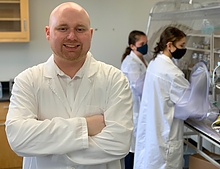Hall Receives $3.5M in Federal Funding for Innovative Gut Microbiome Research

A University of Maryland expert in computational biology has been awarded significant federal funding to uncover the mysteries of the human gut microbiome.
Brantley Hall, an assistant professor of cell biology and molecular genetics with an appointment in the University of Maryland Institute for Advanced Computer Studies (UMIACS), is the recipient of two awards from the National Institutes of Health (NIH) totaling $3.5 million.
The federal funding—a $1.9 million R35 investigators award from the National Institute of General Medical Sciences and a $1.6 million R33 phased innovation grant from NIH—will support Hall’s groundbreaking work in the characterization of microbial enzymes and the development of novel wearable devices for monitoring gut health.
The gut microbiome is an intricate ecosystem composed of trillions of microorganisms, including bacteria, fungi, parasites and viruses. Each person has their own unique microbiome, which is influenced by their diet and environment. This complexity makes studying gut health considerably challenging for researchers, resulting in a lack of in-depth knowledge about the gut.
With support from the R35 award over the next five years, Hall and his research team aim to address these challenges, in part by systematically identifying and characterizing a class of microbial enzymes called ene-reductases. These enzymes play a pivotal role in the intricate interactions between gut microbes and their human hosts.
“By discovering key gut microbial enzymes, we aim to uncover how gut microbial biotransformations influence overall human health,” Hall says.
The R33 grant will provide three years of funding for Hall’s team to develop wearable devices that will enable the real-time monitoring of gut microbial activity. This project aims to translate laboratory findings into practical applications, Hall says, and has the potential to revolutionize the way gut health is measured and managed.
In a broader sense, Hall says this latest round of research funding supports work that will help his team and other scientists highlight the symbiotic relationship between humans and gut microbes. As hosts, we provide our gut microorganisms with shelter and food, and in return, they help us keep our body functioning well, he explains.
These same microorganisms break down dietary fibers and carbohydrates that we can’t digest on our own. They not only affect our digestion, but also interact with a range of organs and systems in our body.
For instance, the gut microbiome affects liver function through the gut-liver axis, a key focus of Hall's research. A recent study by Hall discovered that our gut microbes’ interactions with liver enzymes is what produces the distinct yellow color of urine.
While most gut microbes are beneficial, some bacteria can contribute to various health issues. Disorders linked to harmful microbial activity include Inflammatory Bowel Disease (IBD), which affects millions globally. Certain gut bacteria can even produce compounds that elevate risk factors for heart disease, highlighting the broad impact of the microbiome on overall health.
Hall’s research offers significant insights into understanding gut-related disorders and advancing effective treatments. However, the journey toward these breakthroughs has been marked by considerable challenges.
“Gut microbes are really hard to grow,” Hall explains. Although his team uses an anerobic chamber, an environment in which conditions like temperature and oxygen can be carefully controlled, cultivating these enzymes is an incredibly difficult task.
“Identifying the right enzyme among millions of genes is like searching for a needle in a genomic haystack,” Hall says. He and his team use a complex mix of bioinformatics and biochemistry to identify which enzymes are involved in what reactions.
Given the complex nature of gut microbiome research, providing institutional support to researchers is essential, Hall says.
At the University of Maryland Center for Excellence in Microbiome Sciences, where Hall is an active member, he works with researchers from a diverse range of disciplines, including food safety and nutrition, computer science, bioengineering, civil and environmental engineering, and more.
He also acknowledges the support from UMIACS, which provides technical and administrative services and is home to the Center for Bioinformatics and Computational Biology, which offers additional computational resources.
“I am deeply thankful to the NIH for their continued investment in microbiome research and to the centers and institutes at the University of Maryland that provide the resources and collaborative environment essential to the success of these projects,” Hall says.
—Story by Aleena Haroon, UMIACS communications group
